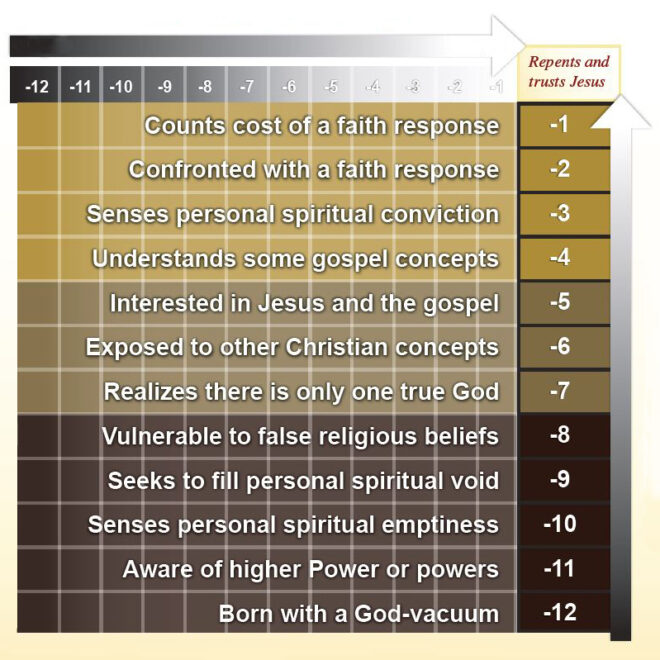Gospel Knowledge Deficiencies

For a teacher, the flip side of considering what your students DO know about your subject is considering what they do NOT know. And the next step is to give them what they MUST know in order to know what they NEED to know.
You may want to let that sink in, because it is important for those of us who want to share the gospel with unbelievers.
Earlier in this series of articles, we introduced the vertical dimension of the Good Soil Evangelism and Discipleship scale, which illustrates levels of gospel understanding—what specific unbelievers KNOW about the truths of the gospel of Jesus Christ.

Most of us probably have friends and other acquaintances whose names could be placed at a variety of levels on the scale. This scale is a good tool to help us think about what these people KNOW about the true gospel, so that we know where to begin in presenting the good news of Jesus Christ to them.
But, the flip side of this can be very revealing! What gospel truths do they NOT know? What gospel truths might we falsely assume they know, when in reality they do not know or do not understand them?
At Level -4: Understands Some Gospel Concepts

We might think that -4 is “way up the Good Soil scale” if the starting level is -12. And so it is, if we consider the major theological concepts taught in the Bible that a person has learned in order to be at -4.
But even at this level that we call “Reaping Evangelism,” an unbeliever is not ready to make a genuine faith response to accept Jesus Christ as Savior. On the graphic above, read the eight “deficiencies in gospel knowledge” statements for -4. Some of these may still be major faith-obstacles for an unbeliever.
For example, in this world of "multiculturalism" and "religious inclusivism," your unbeliever-friend may find it difficult to accept the Biblical truth that Jesus is the only way to God. And, for many unbelievers, the concept of salvation being solely "by grace through faith" and "not of works" is a major obstacle to reckon with.
At Level -7: Realizes There Is Only One True God

Monotheism, the belief that there is only one true God, is a major step away from many paganistic worldviews. Only three of the major religions in the world adhere to monotheism—Islam, Judaism, and Christianity. All three of these are in various ways rooted in the Bible’s Old Testament. So, in one sense, the -7 level of the Good Soil scale is a key theological dividing point.
But many monotheists (believers in one true God) are still ignorant of key gospel truths that they must embrace in order to be truly reconciled to the one true God of the Bible.
While they may, in some sense, accept the Old Testament as divinely inspired, orthodox Jews and devout Muslims do not accept the entire Bible as the inspired, written Word of God. And many who would call themselves “Christians” would not understand any of the Bible to be God’s inspired Word to mankind. While a person at level -7 might have some degree of understanding regarding sin and judgment, his or her understanding of God’s plan for the forgiveness of sin would not be Biblically accurate. And the truth that Jesus is God’s unique Son and a perfectly innocent Man who died as the substitute sacrifice for our sin would be totally unknown to, or disbelieved by, a person at this level of spiritual understanding.
This mid-range of the scale we call the “Planting Evangelism.” For unbelievers who have come to grips with the baseline essentials of a monotheistic worldview (belief that there is only one true God), the next level of our evangelistic responsibilities is to plant the distinctive seeds of Christianity—the Bible as God’s Word, God as a righteous Judge and loving Father, and Jesus as God’s unique Son.
At Level -11: Aware of Higher Power or Powers

There is no such thing as a born-atheist; there are only self-developed or self-deceived atheists. Everyone is born with what theologians have often referred to as a “God Vacuum,” a hole in our hearts that longs to be filled with God.
Romans 1:20 For since the creation of the world God’s invisible qualities—his eternal power and divine nature—have been clearly seen, being understood from what has been made, so that people are without excuse. (NIV)
Thus, to varying degrees all people are aware of a higher Power, even though some people attempt to deny or suppress that awareness. But a person at this lowest (-11) level needs a lot of gospel-related truths before he or she is ready to respond in faith to Jesus Christ for salvation—truths about who God is and what He is like, truths about sin and the desperate nature of our sinful condition, and truths about the eternal consequences for sin.
Although occasionally we may hear stories of gospel-ignorant people making quick conversions to faith in Jesus, genuine conversions like that would be rare. In the divine-and-human interactive process of evangelism, it is the believer’s responsibility to proclaim clearly the content of the gospel. Evangelism on the lower end of the scale, which we call “Tilling Evangelism,” requires a lot of gospel content and generally requires a lot of time.
If this “Tilling Evangelism” requires a lot of Biblical, gospel content, it is essential that we choose evangelistic resources that appropriately provide the depth of gospel content that these unbelievers need in order to make a good soil faith response. In the next article, we will analyze some of common gospel resources to try to ascertain their effectiveness for unbelievers on the lowest range of the Good Soil scale.
Previous articles in this series:
- Three Greek Verbs Define Good Soil
- Assessing Unbeliever’s Gospel Understanding
- Assessing Gospel Receptivity
- Initial Contact or Relational Evangelism—or Both?
- The Problem of Gospel Static
- One Gospel - Three Worldviews
- Worldview “Noisy” Neighborhoods
- How To Understand Worldviews: I’m an Onion – You’re an Onion
- How To Witness to A Non Believer: 3 Step Guide To Using Verbal & Non Verbal Communication

Gaining Ground with Good Soil | Visually Enhanced Edition - An evangelism and discipleship training narrative that is a scaled-down version of the Good Soil E&D seminar in a narrative format. It follows hard-working, dedicated missionaries who are contemplating leaving the field because of a lack of solid fruit. A last-gasp Bible study reveals a theology of evangelism and discipleship that inspires and equips them to continue to pursue their calling. The principles gained from this theology are applicable to anyone wishing to serve God through biblical evangelism and discipleship. Free resources for individual and group study are also available for download.



